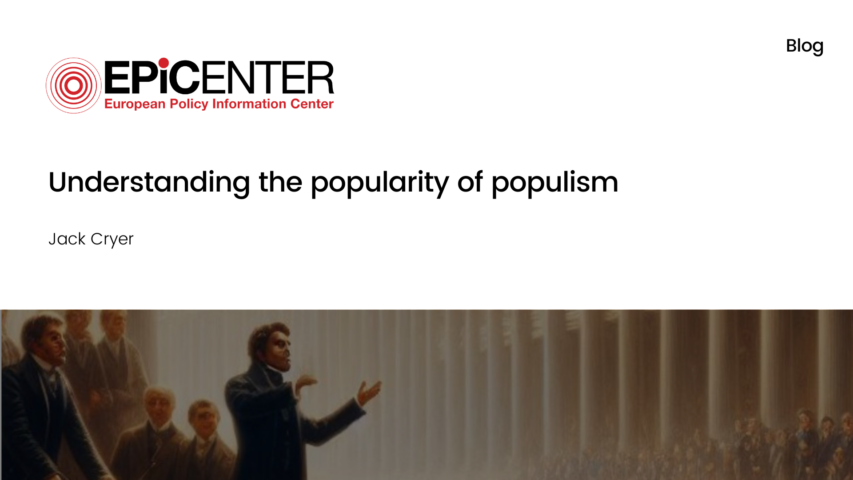Understanding the Popularity of Populism

Understanding the Popularity of Populism
Jack Cryer // 2 April 2024
When COVID-19 hit, there were three questions on everyone’s minds: what was it, where did it come from, and how do we stop it. European Council President Charles Michel has said that the growing trend of populism is “like a virus”. Yet – akin to several European leaders – he has failed to answer, or even ask, the questions we all had during that difficult phase.
With populist leaders and parties predicted to make sizable gains in this year’s European parliamentary elections (Cunningham et al 2024), understanding and providing workable solutions to the prevailing populist mindset is as crucial as ever. While populist complaints do allow one to identify real issues, they will continue to result in ineffective solutions so long as people’s anger is directed towards general targets such as ‘the elite’ and ‘globalism’. For us, and them, to understand the rightful target of their discontent, we must better understand the movement’s philosophy.
This two-part essay will attempt to answer three questions: what is it, where did it come from, and how do we stop it?
What is it?
While definitions vary, most descriptions of populism involve a perception, on the part of ‘ordinary people’, that their concerns have been disregarded by the ‘established elite’. This sentiment is often accompanied by a distrust of experts and academia, in favour of, in the words of William Riker, the position that the “will of the people” (1982: 238) ought to be government policy – that “the people are free when their wishes are law” (1982: 238).
Populism is not a single unified political ideology like conservatism or liberalism. There are as many forms of populism and as many reasons for becoming a populist as there are populists. Thus, given the varied reasons people have for subscribing to this ideology, we require varied solutions to convince those involved that there are alternatives to their antagonistic stance.
There are two fundamental misunderstandings at the heart of populism. First is the lack of recognition of the fact that there will always be some form of oligarchy even in a democracy. Power in a representative democracy must, by definition, be held by a small group of representatives and bureaucrats between elections. The second lies in their general antagonism toward experts. Experts are good at providing a certain type of evidence in a specific field and should be trusted to do so. Populists should be more specific in their – perhaps unintentional – diagnosis of a very real problem: experts doing what they should have never tried to do – stepping outside their field and attempting to prescribe policies for millions of individuals. No expert or centralised body can marshal the fragmented information and knowledge of people’s preferences required to do so. In the words of economist Christopher Coyne: “By attempting to replace markets with expert rule, planning removes the very mechanism that is necessary to facilitate large-scale social cooperation” (Lavoie 1985).
Where did it come from?
Populism is a complex ideology with varied roots. While here I will only discuss one origin, the rate of change of immigration, culture, and identity politics are also undoubtedly among the primary causes.
A perhaps surprising possible starting point is the post-war decades, where revolutionary advances in production methods and global interconnectedness boomed, leading to unprecedented levels of trade and openness – both in markets and social life. This liberalisation of global commerce has brought billions out of poverty and changed the world. However, even the best changes are not unequivocally good for all involved. Oftentimes, we are less considerate than we can be of the ‘destructive’ aspect of ‘creative destruction’. The fact is that many have been left behind by the geographical mobility of jobs as well as the structural changes in economies that inevitably accompany progress. This ramification is further compounded by communications technology and social media, which tend to make the successes of others more evident to those who may already feel left behind.
The improvements many have experienced in recent years have been accompanied by stagnating productivity and output growth in other, less competitive sectors of the economy and geographic locations. Various governments have been guilty of instituting policies that constrict housing and energy supply, labour markets, and lifestyle choices. Simultaneously, they have increased taxes, welfare spending, and regulations on businesses.
Given the problems some in society were already facing, it is perhaps little wonder that they have turned to energetic, purposeful, and determined populist movements as an alternative to the supposedly liberal governments that have served them nothing but a hollow course of paternalism, restraint, and economic lethargy.
After having thrown the evidence-based baby out with the technocratic bathwater, it is easy to blame one’s problems on whichever issue du jour seems most appropriate. Donald Trump, Viktor Orban, and certain wings of the Brexit movement looked to blame immigration, various experts, and EU leaders, respectively, rather than devising evidence-based policies to address the true origins of people’s mostly legitimate concerns. It is, of course, much simpler to blame refugees for our issues than acknowledging poor urban planning regulations. It is catchier to complain about the uncaring Brussels elite than about the problems that arise from the poor incentives windfall taxes create for energy markets.
Yet, there is light at the end of the tunnel. Having identified some likely origins of the movement, the next part of this essay will attempt to provide answers to the third question: how do we stop it?
EPICENTER publications and contributions from our member think tanks are designed to promote the discussion of economic issues and the role of markets in solving economic and social problems. As with all EPICENTER publications, the views expressed here are those of the author and not EPICENTER or its member think tanks (which have no corporate view).



